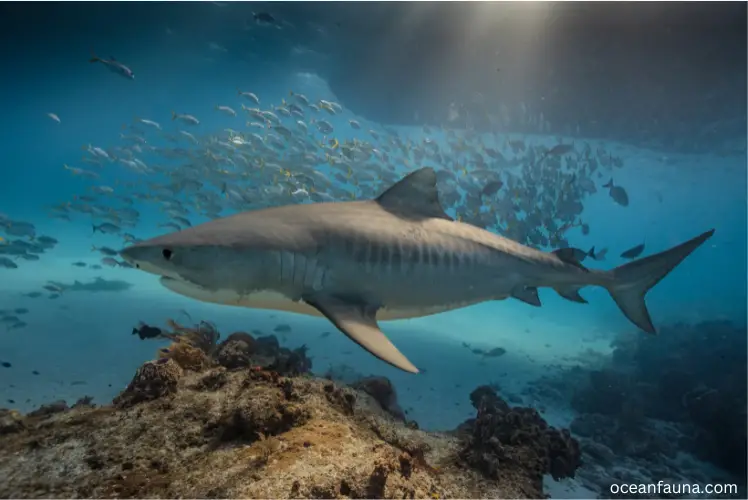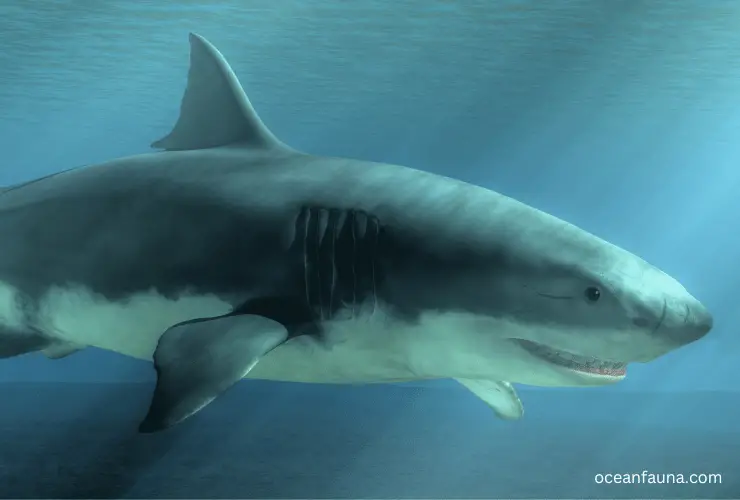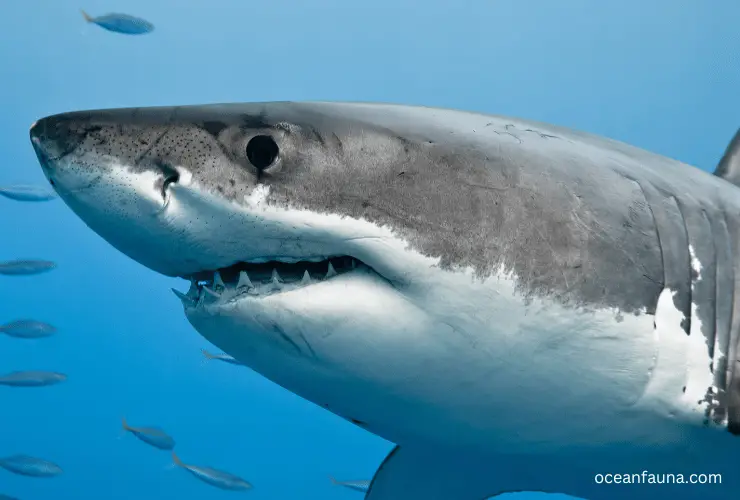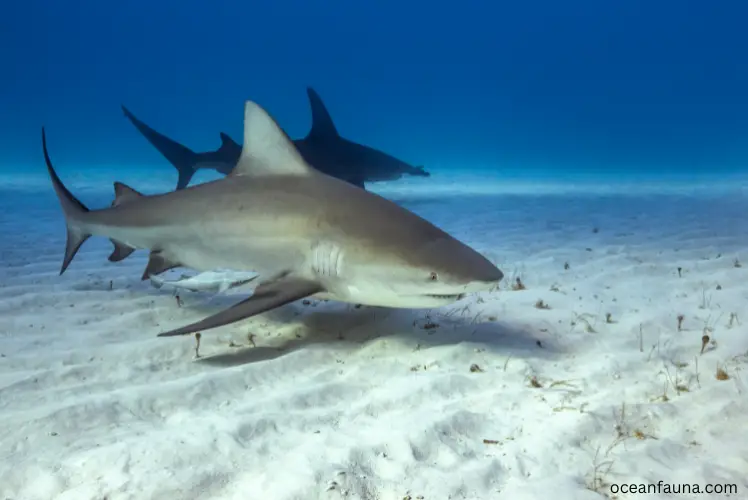Sharks, you know, are mostly known as formidable ocean predators. But here’s the thing: are they smart? If you compare them to other fish, they can be pretty clever, especially when they’re in hunting mode.
But let’s be real; when it comes to marine mammals like dolphins, sharks don’t quite measure up in the intelligence department. Maybe that’s one reason why sharks are a little afraid of dolphins.
In this article, I’ll dive deeper into how smart sharks are and how they handle different situations. So, let’s get into it!
Sharks Brain: Anatomy, Size & Functions
One of the most important aspects of any animal is its brain, and the shark’s brain is no exception. Let’s delve into the shark brain’s anatomy, size, and functions.
Anatomy
The shark brain is located in the skull and is comparable in size to a human brain. However, the shape and structure of the shark’s brain vastly differ from that of a human brain. In general, the shark brain is elongated in shape and has a highly specialized organization of its different parts.
The cerebellum is the largest part of the shark brain, responsible for coordinating motor functions such as swimming and hunting. The olfactory bulb is also a significant part of the shark brain, primarily responsible for detecting and processing smells.
Size
Shark brain size varies across species, with larger species boasting proportionally larger brains. Typically, an adult shark’s brain weighs around 2-4% of its body weight, amounting to approximately 0.5-1.5 pounds for larger sharks.
For example, the great white shark has a brain that is about (60 cm long) 2% – 3% of its total body weight, while the smallest shark species have brains that are just a few millimeters in size. This is in contrast to other animals, such as humans, where the size of the brain is typically correlated with intelligence.
Functions
The shark brain is vital for the survival of these creatures. It is responsible for basic functions such as respiration, circulation, and locomotion. However, the shark brain is also integral to their unique hunting abilities. The cerebellum coordinates the movements of the shark’s fins, allowing them to swim with impressive speed and agility.
The olfactory bulb is one of the most critical parts of the shark brain, responsible for the shark’s acute sense of smell. This enables them to detect the presence of prey over vast distances in the ocean. The brain is also responsible for processing visual information and sound, which is essential for hunting and navigation purposes.
Are Sharks Smart and Intelligent?

Sharks are indeed smart and intelligent creatures, as evidenced by various scientific observations and studies. While there is no standardized method of measuring the IQ of sharks, researchers have noted that these apex predators possess a broad range of cognitive abilities and behavioral traits that demonstrate their intelligence.
One example of shark intelligence is its ability to learn from experience. Studies have shown that sharks can remember specific feeding locations and modify their hunting strategies based on their past successes or failures. Researchers also believe that sharks can distinguish and recognize individual human divers, indicating an ability to learn and remember complex social cues.
Moreover, sharks can adapt to changing environments and exhibit problem-solving skills. For instance, some sharks can navigate oceanic currents and even migrate across vast distances. Others have been known to use their keen senses, such as electroreception and chemoreception, to locate prey in murky water or when food is scarce.
In addition, sharks display complex social behaviors, including hierarchical structures and social learning. Grey reef sharks, for example, form stable communities with defined territories and hierarchies. Meanwhile, some shark species display communal hunting techniques, indicating social learning and cooperation.
How Smart Are Sharks?
Sharks have long been seen as one of the more fearsome animals of the sea, known for their razor-sharp teeth, lightning-quick movements, and ability to hunt down prey with precision.
However, over the years, research has shown that sharks are not just mindless killing machines. Instead, these creatures have been found to possess surprising intelligence and complex behaviors that surpass many people’s understandings.
Sharks have complex social interactions, forming unexpected bonds and exhibiting individual personalities. This behavior, typically seen in intelligent mammals like dolphins, has also been observed in sharks.
Sharks are impressive problem solvers, remembering puzzle solutions for up to a year. Their larger brain-to-body size ratio indicates higher intelligence. This neural capacity enables them to tackle complex tasks with ease.
Moreover, sharks exhibit social learning and can learn certain behaviors from observing other sharks. For example, some species of sharks are known to learn how to feed in an area by watching other sharks and tailing them to their food source. This type of behavior not only demonstrates the intelligence of the animal kingdom but also shows that sharks can cooperate and communicate with each other to achieve a common goal.
Proof of Sharks’ Intelligence
Here are some examples of the cognitive abilities displayed by sharks:
Social Behavior

Sharks exhibit complex social behaviors that are typically associated with highly intelligent mammals. They show individual personalities, establish social bonds, and create long-term relationships.
Sharks also form stable communities with defined territories and hierarchies, and some species even display communal hunting techniques, indicating social learning and cooperation. Studies have shown that sharks can recognize individual human divers and modify their hunting strategies based on their past successes or failures.
Furthermore, sharks hang out with certain individuals more often than expected due to chance, indicating that they exhibit complicated social interactions. The ability to communicate and cooperate to achieve a common goal is a hallmark of intelligence.
Problem-Solving Skills
Sharks are capable of problem-solving and can remember solutions to puzzles for almost a whole year. Researchers have found that some species of sharks can navigate oceanic currents and even migrate across vast distances to locate food sources. Moreover, sharks have keen senses, such as electroreception and chemoreception, which they use to locate prey in murky water or when food is scarce.
Their impressive problem-solving skills and adaptability come from their relatively larger brains, which give them the neural capacity to process complex information and recall it when needed. This brain-to-body size ratio is an important indicator of intelligence potential.
Learning Abilities
Sharks exhibit strong learning abilities, including social learning. As I mentioned above, they can learn from previous experience. Some species have learned how to feed in a particular area by observing other sharks and tailing them to their food source. Sharks can also remember specific feeding locations and modify their hunting strategies based on their past successes or failures.
Researchers believe that sharks can distinguish and recognize individual human divers, indicating their ability to learn and remember complex social cues. This learning ability allows sharks to adapt to changing environments, which is essential for their survival.
Which Shark Is the Smartest?

Among all the species of sharks, the great white shark has been considered the smartest because of its impressive brain size. The great white shark’s brain accounts for about 2%-3% of its total body weight, which is relatively larger than most other species of sharks. This means that the great white shark has the potential for a higher level of cognitive function.
To understand the intelligence of the great white shark, it’s important to first understand the size and complexity of its brain. The great white shark has a complex brain structure with a highly developed cerebellum, which controls coordination, balance, and motor skills.
Additionally, the great white shark has a large corpus callosum, which connects the brain’s two hemispheres and allows for better communication and coordination.
The intelligence of the great white shark is further exemplified through its hunting techniques. The great white shark is a strategic predator, using its cognitive abilities to hunt prey effectively. They have a keen sense of smell and can detect prey from several miles away. Once the prey is detected, the great white shark uses its speed, agility, and strength to ambush and capture its prey effectively.
Furthermore, great white sharks have also been observed to display signs of social behavior, indicating higher intelligence. They have been observed to swim in groups and communicate with each other through body language and vocalizations.
Are Sharks Smarter Than Dolphins?
No, sharks are not smarter than dolphins. While sharks possess impressive predatory skills and specialized senses, their intelligence level falls far behind that of dolphins.
Firstly, the size of the brain in a species is not always an accurate measure of intelligence. The structure and organization of the brain play a more significant role in determining cognitive abilities. Sharks’ brain is less complex than dolphins. The neocortex, a part of the brain responsible for higher-order thinking, social behavior, and language, is notably absent in sharks.
On the other hand, dolphins possess a relatively twenty-five percent brain more extensive than sharks. Brain size is not the only attribute distinguishing dolphins from sharks. The complexity of the dolphin’s brain is notably higher and features a more significant neocortex. This unique structure enables dolphins to perform various advanced cognitive abilities, including problem-solving, self-awareness, and communication.
Besides the differences in brain structure, the abilities of sharks and dolphins also vary. Sharks possess a keen sense of smell and hearing; some species can detect electrical fields. These skills, particularly detecting electric fields, help sharks in capturing prey in murky waters.
Sharks also possess a sensory organ known as the lateral line. This organ senses minute changes in water pressure and helps sharks identify the movement and direction of potential prey.
Dolphins, in contrast, do not have an acute sense of smell like sharks, but they possess exceptional sonar capabilities, which enable them to detect objects in their surroundings. Dolphins also possess a remarkable ability to think abstractly and use tools, such as using sponges, to protect their beaks while foraging.
Are Sharks Smarter Than Humans?

In short, sharks are not smarter than humans. While sharks possess certain cognitive abilities and hunting techniques that make them formidable predators, human intelligence is far superior and unparalleled in the animal kingdom.
Sharks do possess a degree of intelligence. They have a complex sensory system that allows them to sense and respond to surrounding stimuli, such as light, sound, and electrical fields. They also exhibit social behavior, such as schooling, communication, and territoriality. Additionally, they are capable of learning and adapting to changing environmental conditions.
However, when we compare the intelligence of sharks to that of humans, the differences are significant. Human intelligence is marked by advanced cognitive abilities such as language, abstract reasoning, problem-solving, creativity, and emotional intelligence. We have the ability to create and use tools, communicate complex ideas, build civilizations, and contemplate abstract concepts like morality, justice, and ethics.
The human brain is much larger and more complex than that of sharks. It has more neurons and specialized regions that allow for higher-level thinking processes. It also gives us a much greater capacity for memory, learning, and cognitive processing.
Scientifically speaking, the human brain has a cognitive capacity of 2.5 Petabytes (1015 bytes) of memory, compared to a shark’s brain, which has only 0.01 Petabytes of memory. This vast difference in cognitive ability is reflected in our ability to harness and manipulate the natural environment to our benefit, creating complex technologies in various fields.
Conclusion
Now you have detailed information on sharks’ smartness. For a million years, they are surviving because of their intelligence and adaptations. While sharks possess certain cognitive abilities and hunting techniques that make them formidable predators, human intelligence is far superior and unparalleled in the animal kingdom.
We have used our advanced cognitive abilities to create civilization, enabling us to shape the world around us for our benefit. Sharks can hunt effectively with their senses, but their cognitive abilities are far below that of humans.
Let me know if you have more queries about sharks’ smartness and intelligence. I will answer them as soon as possible.
